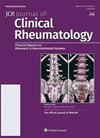持续发热性肌痛综合征:家族性地中海热罕见而棘手的表现。
IF 2.4
4区 医学
Q2 RHEUMATOLOGY
引用次数: 0
摘要
目的:持续发热性肌痛综合征(PFMS)的特征是家族性地中海热患者出现持续数周的严重肌痛、发热、腹痛和关节痛/关节炎发作。治疗方法包括非甾体抗炎药、皮质类固醇激素和抗白细胞介素-1疗法。本研究旨在分享我们在 PFMS 方面的经验,以揭示这种罕见而难以捉摸的疾病。方法本横断面分析纳入了 2018 年 1 月至 2023 年 9 月期间在我们的儿科风湿病诊所确诊为 PFMS 的 17 例患者。结果在我们的诊所,1663 例家族性地中海热患者中有 17 例(1%)表现为 PFMS,其中 10 例患者(58.8%)的初始表现为 PFMS。在这17名患者中,有8名患者的MEFV基因发生了M694V同源突变。磁共振成像显示,仅有1名患者出现肌炎和筋膜炎,另外5名患者仅出现肌炎。2名患者服用非甾体抗炎药后症状有所改善,12名患者服用泼尼松龙后症状有所改善,3名患者需要服用阿那金拉。结论PFMS综合征很难识别,因为它有时可能是家族性地中海热的首发表现。尽管发热是该综合征名称的一部分,但有些患者并不伴有发热。大多数患者对非甾体类抗炎药或皮质类固醇反应明显。对于某些 PFMS 患者,长期服用 anakinra 或 canakinumab 比短期(5 到 7 天)服用 anakinra 更能预防 PFMS 的严重发作。本文章由计算机程序翻译,如有差异,请以英文原文为准。
Protracted Febrile Myalgia Syndrome: A Rare and Difficult Manifestation of Familial Mediterranean Fever.
OBJECTIVE
Protracted febrile myalgia syndrome (PFMS) is characterized by severe myalgia, fever, abdominal pain, and arthralgia/arthritis episodes lasting for several weeks in patients with familial Mediterranean fever. Treatment options include nonsteroidal anti-inflammatory drugs, corticosteroids, and anti-interleukin-1 therapy. This study aimed to share our experiences of PFMS so as to shed light on this rare and elusive condition.
METHODS
This cross-sectional analysis included 17 patients diagnosed with PFMS at our pediatric rheumatology clinic between January 2018 and September 2023.
RESULTS
In our clinic, 17 (1%) of 1663 familial Mediterranean fever patients presented with PFMS, and it was the initial manifestation in 10 patients (58.8%) in the cohort. Eight of the 17 patients had an M694V homozygous mutation in the MEFV gene. A magnetic resonance imaging showed myositis and fasciitis in just 1 patient, and myositis alone was evident in 5 others. Symptoms improved in 2 patients with nonsteroidal anti-inflammatory drugs, whereas prednisolone improved symptoms in 12 patients and anakinra was required in 3 patients. Patients who received anakinra had another severe attack and required long-term anakinra or canakinumab.
CONCLUSIONS
Syndrome for PFMS is difficult to recognize as it can sometimes be the first manifestation of familial Mediterranean fever. The syndrome is not accompanied by fever in some patients, even though the word febrile is part of its name. Most patients respond dramatically to nonsteroidal anti-inflammatory drugs or corticosteroids. In some patients with PFMS, long-term anakinra or canakinumab treatment may be more useful in preventing severe attacks of PFMS than short-term (5 to 7 days) anakinra treatment.
求助全文
通过发布文献求助,成功后即可免费获取论文全文。
去求助
来源期刊
CiteScore
3.50
自引率
2.90%
发文量
228
审稿时长
4-8 weeks
期刊介绍:
JCR: Journal of Clinical Rheumatology the peer-reviewed, bimonthly journal that rheumatologists asked for. Each issue contains practical information on patient care in a clinically oriented, easy-to-read format. Our commitment is to timely, relevant coverage of the topics and issues shaping current practice. We pack each issue with original articles, case reports, reviews, brief reports, expert commentary, letters to the editor, and more. This is where you''ll find the answers to tough patient management issues as well as the latest information about technological advances affecting your practice.

 求助内容:
求助内容: 应助结果提醒方式:
应助结果提醒方式:


